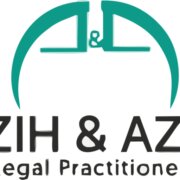Best Retirement Lawyers in Nigeria
Share your needs with us, get contacted by law firms.
Free. Takes 2 min.
Or refine your search by selecting a city:
List of the best lawyers in Nigeria
About Retirement Law in Nigeria
Retirement in Nigeria is governed by laws and regulations designed to ensure that individuals who retire from active work have financial support during their post-retirement years. The key legislation in this area is the Pension Reform Act 2014, which aims to provide financial security for workers by establishing a Contributory Pension Scheme (CPS). The Act compels employers and employees to make contributions into a Retirement Savings Account (RSA) managed by Pension Fund Administrators (PFAs). The law covers both public and private sectors, each with specific guidelines about retirement age, pension benefits, and the processing of retirement paperwork.
Why You May Need a Lawyer
People may require legal assistance in the field of retirement for various reasons. Some common situations include disputes over pension benefits, delays in receiving pension payouts, misunderstanding the terms of pension agreements, and ensuring compliance with the Pension Reform Act. Additionally, navigating changes in pension laws and preparing for voluntary or early retirement can also benefit from legal guidance. Employers may also need legal advice to comply with retirement laws and manage employee retirements effectively.
Local Laws Overview
The Pension Reform Act of 2014 is the bedrock of retirement law in Nigeria. Key aspects of the Act include the establishment of a contributory pension scheme, the licensing of Pension Fund Administrators (PFAs) who are responsible for managing the Retirement Savings Accounts, and regulatory oversight by the National Pension Commission (PenCom). The law mandates that both employers and employees contribute a minimum percentage of monthly emoluments towards these pension accounts.
Retirement in Nigeria is usually at the age of 60 or after 35 years of service, whichever comes first, for most public servants. However, for the private sector, retirement conditions may vary based on company policy. The Act also outlines conditions for accessing retirement funds, including age, health conditions, and financial needs.
Frequently Asked Questions
What is the official retirement age in Nigeria?
Public servants typically retire at the age of 60 or after 35 years of service. However, this may differ in certain specialized sectors or based on company policy in the private sector.
What is a Retirement Savings Account (RSA)?
An RSA is a personal account opened by an employee with a Pension Fund Administrator (PFA) where monthly pension contributions are paid and saved until retirement.
Who oversees pension funds in Nigeria?
The National Pension Commission (PenCom) regulates and oversees all pension matters in Nigeria, ensuring compliance and protection of pension funds.
How are pension contributions calculated?
Under the Pension Reform Act, employers are required to contribute at least 10% of an employee's monthly emoluments, while the employee contributes a minimum of 8%, totaling at least 18% of an employee's monthly salary.
Can I withdraw my pension before retirement?
Early withdrawal from the RSA is generally restricted. However, some provisions allow for withdrawal under critical conditions such as permanent disability or if the employee has been unemployed for a significant period.
What happens if there is a dispute over pension benefits?
Disputes can be settled through the internal grievance redress mechanisms established by PFAs, or through mediation and legal proceedings if necessary.
Can expatriates contribute to the Nigerian pension scheme?
Expatriates are exempt from the compulsory pension scheme unless their employment contract states otherwise.
How does pension work for self-employed individuals?
Self-employed persons can voluntarily join the contributory pension scheme and select a PFA to manage their pension contributions.
Are pensions taxable in Nigeria?
Pension contributions are tax-exempt while in service, but withdrawals from the RSA upon retirement are subject to taxation based on the prevailing tax laws at the time.
What is a PFA and what role do they play?
A PFA, or Pension Fund Administrator, is an organization licensed to manage and invest the pension funds of contributors and ensure that retirement savings grow over time.
Additional Resources
For more information, individuals can reach out to the National Pension Commission (PenCom), consult with licensed Pension Fund Administrators (PFAs), or consider organizations like the Nigerian Union of Pensioners and civil societies that provide support and advocacy for retirees.
Next Steps
If you need legal assistance regarding retirement issues in Nigeria, consider consulting with a lawyer specializing in employment or pension law. They can provide personalized advice based on your specific circumstances. Additionally, maintaining records of all correspondences with your PFA and any retirement-related documents will be valuable for resolving any disputes. Be proactive in understanding your rights and obligations under the current pension laws to ensure a smooth transition into retirement.
Lawzana helps you find the best lawyers and law firms in Nigeria through a curated and pre-screened list of qualified legal professionals. Our platform offers rankings and detailed profiles of attorneys and law firms, allowing you to compare based on practice areas, including Retirement, experience, and client feedback.
Each profile includes a description of the firm's areas of practice, client reviews, team members and partners, year of establishment, spoken languages, office locations, contact information, social media presence, and any published articles or resources. Most firms on our platform speak English and are experienced in both local and international legal matters.
Get a quote from top-rated law firms in Nigeria — quickly, securely, and without unnecessary hassle.
Disclaimer:
The information provided on this page is for general informational purposes only and does not constitute legal advice. While we strive to ensure the accuracy and relevance of the content, legal information may change over time, and interpretations of the law can vary. You should always consult with a qualified legal professional for advice specific to your situation.
We disclaim all liability for actions taken or not taken based on the content of this page. If you believe any information is incorrect or outdated, please contact us, and we will review and update it where appropriate.
Browse retirement law firms by city in Nigeria
Refine your search by selecting a city.















